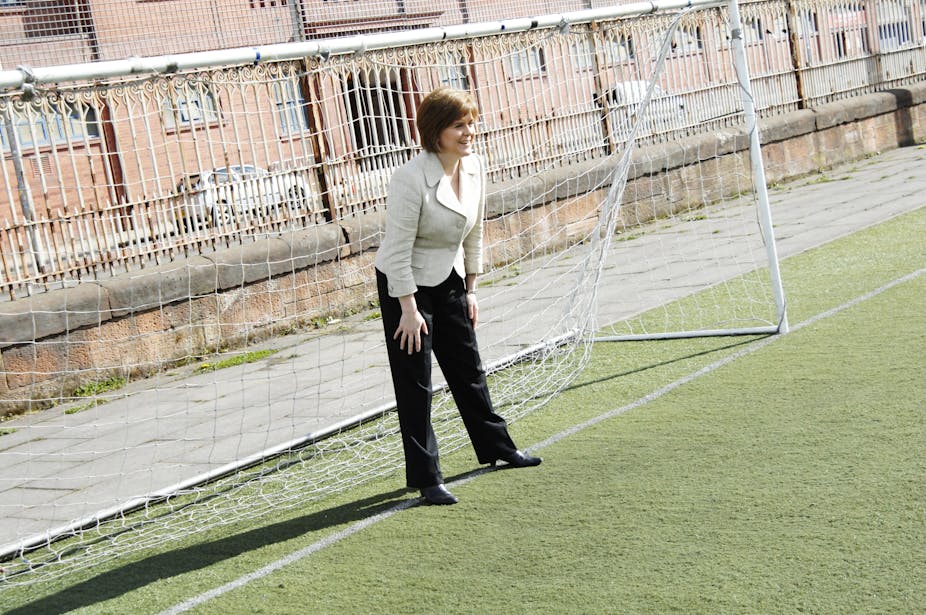One consequence of the 2010 leader debates was that they almost entirely erased women from the political discussion. It has therefore been refreshing, and widely commented upon, that three of the party leaders taking part in the 2015 debates were women – Nicola Sturgeon for the SNP; Leanne Wood for Plaid Cymru; and Natalie Bennett for the Greens.
Of the three, Sturgeon has undoubtedly attracted the most attention. This is partly because of the praise that she has garnered for her strong performances. But it is also because the SNP’s anticipated dominance in Scotland will give it a pivotal role in the post-election coalition negotiations.
Labour has repeatedly ruled out any form of alliance with the SNP; English voters would not approve of a Scottish party having a heavy sway in Westminster, especially on policies that affect only England as they have already been devolved to the other home nations. But the reality is that the Conservatives and Liberal Democrats together will probably not be able to form a majority government, leaving both sides in the position of prospective minority governments. With the SNP much more closely aligned ideologically to Labour than to the Conservatives, the party may well end up propping up a Labour government, whether Labour admits to it or not.
All of this means that Nicola Sturgeon is now one of the central figures in the election. As a Scottish nationalist, she provokes the ire of some of the tabloid press. But as a woman, she also symbolises the battles that women politicians face to be taken seriously.
In Holyrood, she has thrown down the gauntlet with a gender-balanced cabinet and public declarations on the need for gender equality in politics. But in the media, she has been subjected to some pretty vile sexism. Some of the worst scenarios are outlined by the Guardian and the Independent, and include a mock-up image in the Sun of Sturgeon riding a wrecking-ball in a tartan bikini à la Miley Cyrus.
There have been comments aplenty on her appearance; for example, the Daily Mirror states:
She’s lost shed-loads of weight. She’s got a sleeker, less carroty new hairdo. She’s got a natty new wardrobe of suits with matching stilettos and confidence way beyond her abilities.
The Daily Mail also used comments on her appearance to diminish her, referring to her as a “wee woman”, and has also run endless pointless stories about her appearance.
Even more insultingly, it produced a cartoon of Ed Miliband nestled in between Sturgeon’s breasts. The Sun had a cartoon of “Ed Milibond” with the three female party leaders dressed in revealing red lingerie and fawning over him. The article calls them the “scarlet sisterhood” and described Sturgeon as “doe-eyed”, warning that she “may wear high heels and a skirt, but … she eats her partners alive”.
Attacks below the belt are not unusual in the press, but the sexist nature of these attacks makes them offensive in a different way to the normal electoral warfare. More disturbingly, they are indicative of a wider trend of treating women politicians in a disgraceful and degrading manner.
Some of the sexist treatment of women politicians is banal, such as the repeated use of a woman’s first name rather than her surname or full name (we have Cameron, Miliband, Clegg and … Nicola). It makes women sound familiar, which can add warmth but deny them the stature of a leader.
Sometimes treatment is trivialising, such as the Daily Mail’s infamous Downing Street catwalk. Sometimes it is paternalistic, such as “Blair’s Babes”, “Dave’s Darlings”, “Cameron’s Cuties”, “Gordon’s Gals”, and (worst of all) “Nick’s Nymphets”.
Whether women are portrayed as pretty objects, sexual accessories, frumpy has-beens or femmes fatales, they are forever reduced to their bodies rather than their brains. This creates (at least) two problems.
The first is that it diminishes women, lowering their status and silencing their voices. The second is that it deters women. Any would-be female politician observing how women are treated by the media would be quite justified in deciding not to subject herself to this ordeal.
That women do still keep standing for office in the face of media sexism is testament to their determination. The shortage of women in politics is all too often blamed on women not coming forward, when in fact women do come forward but are less frequently selected, and those who do get selected are often in unwinnable seats. The few who do make it all the way to the top are heroes who have triumphed over adversity; it’s high time our media started showing them the respect they deserve.

